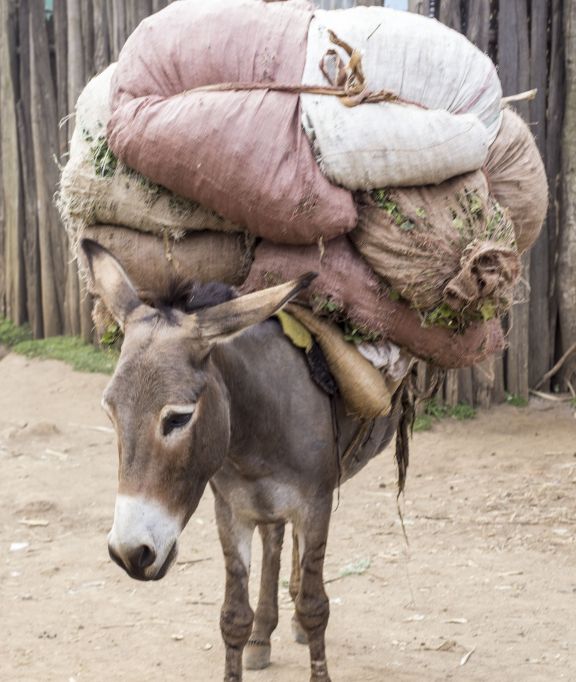I have a suggestion for long-time New York Times opinion columnist Nicholas Kristof. To read what it is, please click here.


I have a suggestion for long-time New York Times opinion columnist Nicholas Kristof. To read what it is, please click here.

Folk maxims reflect truths, which is why the Talmud often invokes such aphorisms with the introduction“kidi’amri inshi” – “as people are wont to say.”
One valuable truth is the subject of two English sayings that don’t have a Talmudic aphorism-cognate. The truth, though, is telegraphed by the Torah itself, in one word, in parshas Behar.
“A stitch in time saves nine” and “an ounce of prevention is worth a pound of cure” both communicate the fact that a modest effort expended in a timely manner can prevent the need for a much greater effort down the line.
In the Torah, that message lies in the word “vihechezakta” – “and you should strengthen” in the pasuk “Should you brother become impoverished and his means falter near you, you should strengthen him, be he a stranger or resident…” (Vayikra 25:35).
Rashi notes that “stranger” refers to a non-Jew who has forsworn idolatry. And goes on to quote the Sifra: “Do not leave him by himself so that he comes down in the world until he finally falls altogether, when it will be hard to raise him. Rather, uphold him from the first moment of the failure of his means.”
The illustration provided is a donkey whose load is tottering. Rushing to straighten it is easy and will prevent the need to strain to lift it off the ground should it fall.
It’s an important, if straightforward, truth: Helping someone in even a small way early in a financial decline can prevent the need for a greater lift from a deeper poverty into which he may otherwise fall.
It can even save his life, as the pasuk continues, “And he will live with you.”
What I find interesting is that the English aphorisms are simple wise advice to an individual, about protecting himself from harm.
In the Torah, the truth is indicated in a word about protecting someone else.
© 2024 Rabbi Avi Shafran

Did you hear? NPR is biased!
Who—other than any mentally uncompromised listener to National Public Radio—knew?
To read what made that revelation newsworthy, click here.

Any “blemish” on a list of congenital or acquired conditions prevents service in the Mishkan or Beis Hamikdash (Vayikra 21:17-24). And there are dozens of other non-listed disqualifying blemishes (see Rashi, ibid 21, and Baal HaTurim there).
That a physical malformation or injury should prevent a kohein from performing certain services is a chok, something not subject to human understanding.
Rav Mechel Twerski notes that a kohein who, due to a physical blemish, is disqualified from Bais Hamikdosh service is being signaled that his destiny, his assignment in life, is to bring the special qualities of a kohein to a non-Beis Hamikdosh role.
The idea that limitations are pointers to the roles we are meant to play is, as I noted three years ago, elsewhere in parshas Emor, in the account of the mekalel, the blasphemer.
Rashi, quoting Rabi Levi in a Midrash, elaborates on the words “And he went out” (Vayikra, 24:10) that “He went out of his world.” His world. Each of us, that might mean, has his or her own world, a unique assignment to be recognized and embraced.
A second Midrash Rashi cites about the phrase “And he went out” is that the blasphemer had just left the court of Moshe, where he had lost his case. He had claimed that, as his mother was Jewish (although his father was an Egyptian), he was entitled to a portion of land in the area of his mother’s tribe, Dan. The ruling, however, was that, while he was a member of the Jewish people, he – uniquely, among the people – owned no portion of the land.
That left him with two options: Either to accept that fate, and recognize that it was “his world” – a personal situation that somehow positioned him for a particular, singular role to play in society. Or to angrily reject the ruling. He chose the second path, to put it mildly. Thus he “left” not only the court but his world. He abandoned his life assignment.
All who see their life circumstances as “unfair” face a similar choice. The key to true success in life is to seize one’s individual, unique circumstance, no matter how limiting or painful or puzzling it may seem, recognizing that it is his or her “own world” – what makes them special. And then, after ascertaining what that specialness might be demanding, getting down to work.
© 2024 Rabbi Avi Shafran

Ultimate concern for oneself is ingrained in our essences. There is a striking Midrash on the pasuk “For my father and mother have abandoned me, and Hashem has gathered me in” (Tehillim 27:10). Dovid Hamelech, says the Midrash, was stating that his parents’ focus at his conception was on their personal relationship; it was about themselves, not him. In that sense, explains the Midrash, they “abandoned” him.
But consider: Dovid’s father was Yishai – one of the four people who Chazal tell us (Shabbos 55b) “died by the counsel of the nachash,” the serpent in Gan Eden. In other words, he was personally without sin. And yet he is being described as, in some way, selfish?
It seems clear that ultimate self-concern is part and parcel of being human. So no one can actually love another quite the same way he loves himself.
Nor can loving one’s fellow like himself mean that one must give each person he meets half of his possessions. That would render him penniless in short shrift.
R’ Meshullam Gross, in his sefer Nachalas Tzvi, notes that the wording of the imperative to love others like oneself uses the word lirei’acha (literally, “to one’s fellow”) rather than the simpler es rei’acha, echoing the wording of the commandment to “not covet… all that is to your fellow” in the Aseres Hadibros (Shemos 20:14).
Thus, he suggests, the imperative here is to consider the possessions – and honor, and concerns… – of one’s fellow as dear to you as if they were yours. In other words, love the fact that your fellow has what he has and deserves what he deserves – as much as you love what you have and feel you deserve.
© 2024 Rabbi Avi Shafran

It’s an image to warm the deepest cockles of any peace-loving heart: A Gaza in peace with Israel, conducting commerce with her, with both countries exchanging tourists and economically prospering as a result. Indeed, by all logic and reason, Gazans should recognize that Hamas’ rule over the territory has brought them nothing but grief, death and destruction.
What chills those cockles, though, is that we’ve seen this play before. In 2005, 21 Israeli settlements in Gaza were unilaterally dismantled and the strip was rendered Judenrein. With the Gazan populace’s approval, Hamas quickly took charge and, well, the rest is tragic history.
Today, six months since the merchants of murder demonstrated the depth of their hatred and barbarism, Gaza’s infrastructure has been destroyed. Hospitals (aka military arsenals), schools (aka missile bases) and countless homes (some of which were just homes). Roads, sewage systems and the electrical grid – are in ruins.
Whether the unprecedented death, destruction and displacement Hamas has brought upon Gazan civilians has convinced them that supporting evil doesn’t pay can’t be known at this time.
But, embracing hope, the U.S. has called for a revitalized Palestinian Authority to administer postwar Gaza ahead of eventual statehood.
The P.A.? Please.
In Mahmoud Abbas’ kingdom of corruption in Yehudah and Shomron, government jobs are doled out to supporters; international aid enriches officials; basic services are spotty; elections haven’t been held for nearly twenty years.
Mr. Abbas, of course, was elated by the U.S. endorsement of even a “reconstituted” Palestinian Authority. And, in March, he announced the formation of a new cabinet, to demonstrate his readiness to step up to the reconstruction plate.
Tapped for prime minister is Mohammad Mustafa, a longtime Abbas adviser. He pledged to form a technocratic government and create an independent trust fund to help rebuild Gaza.
The U.S. National Security Council welcomed the development, contending that “a reformed Palestinian Authority is essential to delivering results for the Palestinian people and establishing the conditions for stability in both the West Bank and Gaza.”
The key word there is “reformed.”
The signs are hardly encouraging. According to Palestinian Media Watch, the new Palestinian Authority’s minister of women’s affairs, Muna Al-Khalili, offered praise in 2018, for Dalal Mughrabi at an event honoring the terrorist, who in 1978 led a group that hijacked a bus and murdered more than three dozen riders, including 12 children. “A quality resistance operation,” Al-Khalili gushed, proclaiming that the attack “proved that Palestinian women are capable of carrying out the most difficult missions.” The most heinous ones, at least.
And, mere weeks after the Shemini Atzeres massacre, Ms. Al-Khalili hailed the “right to resist the occupation” until Palestinians achieve “self-determination, freedom, independence in its sovereign state whose capital is Jerusalem…”
An equally disturbing member of the “revitalized Palestinian Authority” is its minister of religious affairs, Muhammad Mustafa Najem. He has called Jews “apes and pigs” who are full of “conceit, pride, arrogance, rioting, disloyalty, and treachery.” He sermonized that Muslims should “afflict the Jews with the worst torment.”
No, neither the old P.A. nor its “new and improved” version – as a bard once put it, “meet the new boss, same as the old boss” – is a path forward for Gaza. Any respectable government there will have to be something truly novel, an administration whose focus is on the wellbeing of its citizens, not on murdering citizens of a neighbor.
Could that happen?
The latest poll conducted by the Palestinian Center for Policy and Survey Research, on March 20, showed that Gazans’ support for continued Hamas control over the Gaza Strip showed a 14-point rise over the prior three months to more than 50%.
If that reflects Gazans’ true feelings, no sane, responsible government will emerge in the territory. The only grounds for hope are the many reports of Gazans who quietly admit that they hate Hamas but are afraid to speak up.
Their fear is understandable. Hamas has warned Gazans that anyone seeking to undermine its administration of the territory will be treated as a collaborator – which, of course, means execution.
Are there enough Gazans who prefer peace to endless bloodshed and who will vote that preference in some future election?
I’m not taking bets.
(c) 2024 Ami Magazine

And an essay I wrote about the joys of large families was published by Religion News Service last week. It’s here.

Two indistinguishable goats were brought on Yom Kippur before the Kohein Gadol, who placed a randomly-pulled lot on the head of each animal. One lot read “to Hashem” and the other “to Azazel” – the name of a steep cliff in a barren desert.
The first was sacrificed as a holy korban; the second, taken to the cliff and thrown off, dying unceremoniously before even reaching the bottom.
There are two ways to view human life, either as the result of intent or the product of accident. And a corollary follows: Either our lives are meaningful, or they are not.
If the roots of our existence ultimately lie in randomness, there can be no more meaning to good and bad actions than to good or bad plays; no more import to right and wrong than to right and left. Societal norms can be promoted, but a social contract is a practical tool, not a moral imperative. Only if there is a Creator in the larger picture can there be ultimate import to human life, placing it on a plane meaningfully above that of mosquitoes.
The Torah’s most basic message is the meaningfulness of human life.
Might the goat brought as a korban symbolize recognition of the idea that humans are beholden to something greater? And the counter-goat, fate to a desolate, unholy place, allude to the perspective of life as pointless, lacking higher purpose?
Strangely, the Azazel-goat is described by the Torah as carrying away the people’s sins.
Might that mean that sin stems from not realizing how meaningful our lives are? And might a reminder about that idea on the holiest day of the Jewish year spur thoughts of repentance, of re-embracing the grand meaningfulness that is a human life?
© 2024 Rabbi Avi Shafran

Ours are times when it isn’t hard to imagine oneself as a Jew in Mitzrayim – at least according to the way two commentaries understand a word in Devarim.
The word is in one of the pesukim comprising the declaration to be made by those bringing bikurim, the firstfruits of the season, to the Beis Hamikdash. It is, famously, a declaration that the Haggadah expands upon. The word is vayarei’u, often translated as “they [the Mitzri’yim] treated us in an evil way” (26:6).
Abarbanel and the Netziv, however, see the syntax of the word as implying something subtly but decidedly different. They read it as meaning “they ‘eviled’ us” – in other words, they portrayed the descendants of Yaakov as evil. As we would say in English, they vilified us.
Could there be a better way to describe so much of the world’s attitude toward Jews today? To be sure, there are always haters who, as is their wont, hate, for any of an assortment of “reasons” or with no attempt at “justification” at all; that’s nothing new.
But, as a result of civilian casualties in Gaza – unavoidable deaths and injuries like those that have been part of every war in history – Israel has been vilified to an unprecedented extent, not only by the usual suspects but in broad international circles and media. And, tellingly, all Jews – as Jews, simply for being Jews, our opinions unknown and of no concern to the venomous vilifiers – are targeted as well.
Attacks on Jews, physical and verbal, abound across the globe. The despicable chants of “Burn the Jews!” and displays of Nazi symbols at “pro-Palestinian” rallies – a British bobby was recently recorded dismissing a distraught Jewish woman’s complaint about swastika flags at a demonstration by saying they needed to be “taken into context” – is evidence enough of how easily empty-headed people can, under the self-righteous guise of what they proffer as principled political positions slide into… vilification of Jews.
And so it’s no great challenge this year to put ourselves in the places of our vilified ancestors in Mitzrayim. The Haggadah’s mandate that we endeavor to see ourselves as if we, too, were redeemed from Mitzrayim logically includes imagining ourselves in the state that our forebears endured before they went free. After all, an appreciation of redemption must include what it has freed one from.
Although we refer to the splitting of the Red Sea as kri’as Yam Suf, a “tearing” of the waters, that word is not used by the Torah. The Torah’s word for the parting of the waters is vayibak’u – “splitting” or “chopping.”
Noting the use of the same verb to describe Avraham Avinu’s splitting of wood for use in the offering of Yitzchak as an olah to Hashem, Chazal tell us that it was in the merit of that action of Avrohom’s that the sea was able to split.
What was the essence of that merit? It’s more than plausible that it was the perseverance in the face of hopelessness, the selfless determination with which Avraham undertook to follow Hashem’s unfathomable command. Our forefather’s deepest desire lay in a world-changing future for Yitzchak and his eventual descendants. But, it seemed, in light of the command, that there was no hope left to be hoped.
Similarly, when Klal Yisrael found itself faced with a sea before them and an approaching army closing in from behind, hopelessness would understandably have seized them.
And yet, just as the despair Avraham had reason to feel as he split wood for the akeida was later dissipated in a crucial instant, so did the anguish our ancestors experienced at the sea suddenly evaporate, as they watched the waters before them part.
It’s a thought worth pondering these days. Even surrounded by darkening clouds of seemingly mindless, relentless hatred, we do well to remember how hopelessness needn’t be final.
The Egyptian pyramids and the Sphinx, intended to herald the permanence of the power of an ancient dynasty, are today nothing more than tourist attractions, and crumbling ones at that. Our people persists, vibrant and hopeful, looking toward the ge’ulah sheleimah.
© 2024 Ami Magazine

We instinctively think of nega’im as born of lashon hora, “evil speech,” and we’re not wrong. But there is another birther of the condition, one that is evident in the very word metzora: tzarus ayin, “miserly eye” – selfish narrowmindedness, begrudging others one’s possessions.
That is particularly evident in the fact that, in the case of nig’ei batim, the tzara’as that afflicts walls of a house, the owner, before the house is declared tamei by a kohein, is told to take the home’s vulnerable vessels outside, exposing them to public view. What’s more, the Torah’s concern for the owner’s possessions stands as a lesson to him about caring for others’ needs.
Jews, as a people, are famously generous. We may be frugal, but that bespeaks something positive, our recognition of the worth of even small things. When it comes to charity, though, U.S. Jews per capita are more philanthropic than any other ethnic or religious community.
But tzarus ayin can manifest itself in a realm apart from charity. The Kli Yakar sees in the phrase “asher lo habayis” – “that is to him the house” (Vayikra 14:35) – an indication of a miser’s mindset: he thinks the house is truly his, when, in reality, it, like all we may think we “own,” is only temporarily in his control, on loan, so to speak, from Hashem.
Chazal created an entire class of imperatives based on that reality: birchos hanehenin, “blessings to be made before indulging.” When we recite a brachah before enjoying food or even fragrance, we are acknowledging that what is about to benefit us is from Hashem.
It’s ironic that a society like ours today, so blessed with such plenty, is not more careful when it comes to acknowledging our blessings. “Bruchanoi” may be somewhat reminiscent of the first three words of a brachah, but only somewhat. And quickly mumbling a brachah as some sort of irksome incantation without thinking about what its words mean is no replacement for summoning the gratitude the brachah is meant to express.
Even generous eyes can be miserly. Ours shouldn’t be.
© 2024 Rabbi Avi Shafran